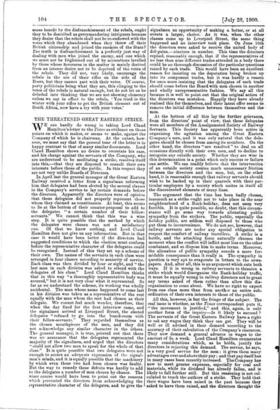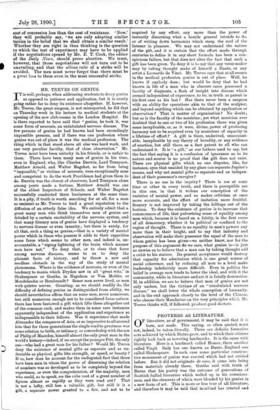THE THREATENED GREAT EASTERN STRIKE.
WE can hardly do wrong in taking Lord Claud Hamilton's letter to the Times as evidence on those points on which it makes, or seems to make, against the Company of which he is chairman. At the outset, how- ever, we must say that the general tone of the letter is in happy contrast to that of many similar documents. Lord Claud Hamilton shows no desire to overstate his case, and his charge against the servants of the Company, who are understood to be meditating a strike, resolves itself into this,—that they are disposed to consult their own interests before those of the public. In this respect they are not very unlike Boards of Directors.
In April last the general manager of the Great Eastern Railway received a letter from a signalman informing him that delegates had been elected by the several classes in the Company's service to lay certain demands before the directors. Apparently the directors were of opinion that these delegates did not properly represent those whom they claimed as constituents. At least, this seems to lie at the bottom of their counter-proposal to add to the delegates "a certain number of their fellow- servants." We cannot think that this was a wise step. It is quite possible that the method by which the delegates were chosen was not a satisfactory one. Of that we know nothing, and Lord Claud Hamilton does not give us any information. But in that case it would have been better if the directors had suggested conditions to which the election must conform before the representative character of the delegates could be recognised. Instead of this they set up a scheme of their own. The names of the servants in each class were arranged in four classes according to seniority of service. Each class was then divided by four or eight, and "the last man in each division was asked to attend with the delegates of his class." Lord Claud Hamilton thinks that in this way "a thoroughly representative body was secured," but it is not very clear what it represented. So far as we understand the scheme, its working was wholly accidental. The man whose name happened to come last in his division was taken as a representative of the rest equally with the man whom the rest bad chosen as their delegate. We cannot feel much wonder, therefore, that when the day fixed for the first interview came, and the signalmen arrived at Liverpool Street, the elected delegates "refused to go into the board-room with their fellow-servants." They regarded themselves as the chosen mouthpieces of the men, and they did not acknowledge any similar character in the others. The general manager, it is true, pointed out that there was no assurance that the delegates represented the majority of the signalmen, and urged that the directors " could not allow two men to speak for the whole of that class." It is quite possible that two delegates were not enough to secure an adequate expression of the signal- men's minds, and it is equally possible that the machinery by which even these two had been chosen was faulty. But the way to remedy these defects was hardly to add to the delegates a number of men chosen by chance. The wiser course would have been to point out the reasons which prevented the directors from acknowledging the representative character of the delegates, and to give the signalmen an opportunity of making a better, or at all events a larger, choice. As it was, when the Other classes came up to Liverpool Street, the same thing happened and no interview took place. On June 10th the directors were asked to receive the united body of delegates,—nineteen in number. This time the directors replied, reasonably enough, that if the representatives of no less than nine different trades attended in a body there could be no thorough discussion of the particular questions raised by each trade. This would have been an excellent reason for insisting on the deputation being broken up into its component trades, but it was hardly a reason for once more insisting that the delegates of each trade should come before the Board with men chosen in another and wholly unrepresentative fashion. We say all this because it is well to point out that the original action of the directors was mistaken. Happily they have already realised this for themselves, and their latest offer seems to remove the initial difference between themselves and the - men.
At the bottom of all this lay the further grievance, from the directors' point of view, that these delegates were all members of the Amalgamated Society of Railway Servants. This Society has apparently been active in organising the agitation among the Great Eastern Company's men, and it was only natural that the dele- gates should be chosen from among its members. On the other hand, the directors "are resolved" to deal on all occasions directly with their own men, and to decline to recognise any outside society. Whether they are wise in this determination is a point which only success or failure can settle. We can readily believe that the intervention of an outside society creates much unnecessary friction between the directors and the men, but, on the other hand, it is reasonable enough that railway servants should wish to be backed up in their quarrels with their par- ticular employers by a society which unites in itself all the discontented elements of many lines.
The argument that the time has been badly chosen, inasmuch as a strike ought not to take place in the near neighbourhood of a Bank-holiday, does not seem very forcible. It is quite possible, no doubt, that this circum- stance will go some way towards alienating public sympathy from the strikers. The public, especially the holiday public, are seldom well disposed to those who put them to inconvenience. We do not see, however, that railway servants are under any special obligation to respect the comfort of railway travellers. A strike is a battle, and the attacking force naturally chooses the moment when the conflict will inflict most loss on the other combatant, and so dispose him to make terms. Moreover, the alienation of public sympathy sounds a more for- midable consequence than it really is. The sympathy in question is very apt to evaporate in letters to the news- papers. And, after all, this is an argument which cuts both ways. If it is wrong in railway servants to threaten a strike which would disorganise the Bank-holiday traffic, it must be equally wrong in railway directors not to grant any terms asked of them rather than allow this dis- organisation to come about. We have no right to expect from one class more than from another an entire sub- ordination of their own interests to those of the public.
All this, however, is but the fringe of the subject. The real issue is whether, as the Times correspondent puts it, "the movement is justified," and this, again, is only another form of the inquiry—Is it likely to succeed ? The servants of the Great Eastern Railway have a right to ask any wages they think they can get. They will be well or ill advised in their demand according to the accuracy of their calculation of the Company's resources. They now demand a general advance in wages to the amount of 3s. a week. Lord Claud Hamilton enumerates many considerations which, as he holds, justify the directors in rejecting this demand. The service he says, is a very good service for the men ; it gives them many advantages over and above their pay; and that pay itself has in many cases been recently increased. The Company has now to meet greater expenses especially for coal and materials, while its dividend has already fallen, and is likely to fall further still. But this reasoning is not cal- culated to touch the authors of a strike. They hold that their wages have been raised in the past because they asked to have them raised, and the directors thought the
cost of concession less than the coat of resistance. Now,' they will probably say, 'we are only adopting similar tactics in the belief that we shall obtain a similar result.' Whether they are right in thus thinking is the question to which the test of experiment may have to be applied if the negotiations opened by Mr. E. T. Cook, the editor of the Daily News, should prove abortive. We trust, however, that those negotiations will not turn out to be unavailing, and that the ultima ratio of a strike will be avoided. The men must never forget that there must be a great loss to them even in the most successful strike.



































 Previous page
Previous page